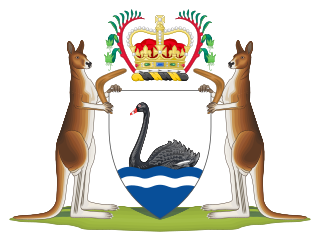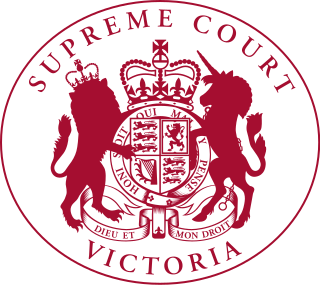
The International Court of Justice, sometimes known as the World Court, is one of the six principal organs of the United Nations (UN). It settles disputes between states in accordance with international law and gives advisory opinions on international legal issues. The ICJ is the only international court that adjudicates general disputes between countries, with its rulings and opinions serving as primary sources of international law.
McCulloch v. Maryland, 17 U.S. 316 (1819), was a landmark U.S. Supreme Court decision that defined the scope of the U.S. Congress's legislative power and how it relates to the powers of American state legislatures. The dispute in McCulloch involved the legality of the national bank and a tax that the state of Maryland imposed on it. In its ruling, the Supreme Court established firstly that the "Necessary and Proper" Clause of the U.S. Constitution gives the U.S. federal government certain implied powers necessary and proper for the exercise of the powers enumerated explicitly in the Constitution, and secondly that the American federal government is supreme over the states, and so states' ability to interfere with the federal government is restricted. Since the legislature has the authority to tax and spend, the court held that it therefore has authority to establish a national bank, as being "necessary and proper" to that end.
In law, an en banc session is a session in which a case is heard before all the judges of a court rather than by one judge or a smaller panel of judges.

The High Court of Australia is Australia's apex court. It exercises original and appellate jurisdiction on matters specified within Australia's Constitution.
Lists of case law cover instances of case law, legal decisions in which the law was analyzed to resolve ambiguities for deciding current cases. They are organized alphabetically, by topic or by country.
Re Kevin – Validity of Marriage of Transsexual, also known simply as Re Kevin, was a 2001 Australian court case brought before the Full Court of the Family Court of Australia regarding the possibility of transsexual people to marry according to their new gender. The court granted the applicant this right.
Landmark court decisions, in present-day common law legal systems, establish precedents that determine a significant new legal principle or concept, or otherwise substantially affect the interpretation of existing law. "Leading case" is commonly used in the United Kingdom and other Commonwealth jurisdictions instead of "landmark case", as used in the United States.

Case citation is a system used by legal professionals to identify past court case decisions, either in series of books called reporters or law reports, or in a neutral style that identifies a decision regardless of where it is reported. Case citations are formatted differently in different jurisdictions, but generally contain the same key information.

The Commonwealth Law Reports (CLR) are the authorised reports of decisions of the High Court of Australia. The Commonwealth Law Reports are published by the Lawbook Company, a division of Thomson Reuters. James Merralls AM QC was the editor of the Reports from 1969 until his death in 2016. The current editors are Christopher Horan KC and Paul Vout KC.

Commonwealth v Tasmania was a significant Australian court case, decided in the High Court of Australia on 1 July 1983. The case was a landmark decision in Australian constitutional law, and was a significant moment in the history of conservation in Australia. The case centred on the proposed construction of a hydro-electric dam on the Gordon River in Tasmania, which was supported by the Tasmanian government, but opposed by the Australian federal government and environmental groups.
The judiciary of Australia comprises judges who sit in federal courts and courts of the States and Territories of Australia. The High Court of Australia sits at the apex of the Australian court hierarchy as the ultimate court of appeal on matters of both federal and State law.

The Supreme Court of New South Wales is the highest state court of the Australian State of New South Wales. It has unlimited jurisdiction within the state in civil matters, and hears the most serious criminal matters. Whilst the Supreme Court is the highest New South Wales court in the Australian court hierarchy, an appeal by special leave can be made to the High Court of Australia.

The Supreme Court of Tasmania is the highest State court in the Australian State of Tasmania. In the Australian court hierarchy, the Supreme Court of Tasmania is in the middle level, with both an appellate jurisdiction over lower courts, and decisions made by Court to be heard on appeal by the High Court of Australia.

The Supreme Court of Western Australia is the highest state court in the Australian State of Western Australia. It has unlimited jurisdiction within the state in civil matters, and hears the most serious criminal matters.

The Supreme Court of South Australia is the superior court of the Australian state of South Australia. The Supreme Court is the highest South Australian court in the Australian court hierarchy. It has unlimited jurisdiction within the state in civil matters, and hears the most serious criminal matters. The Court is composed of a Chief Justice and as many other judges as may be required.

The Federal Court of Australia is an Australian superior court of record which has jurisdiction to deal with most civil disputes governed by federal law, along with some summary and indictable criminal matters. Cases are heard at first instance by single judges. The court includes an appeal division referred to as the Full Court comprising three judges, the only avenue of appeal from which lies to the High Court of Australia. In the Australian court hierarchy, the Federal Court occupies a position equivalent to the supreme courts of each of the states and territories. In relation to the other courts in the federal stream, it is superior to the Federal Circuit and Family Court of Australia for all jurisdictions except family law. It was established in 1976 by the Federal Court of Australia Act.

A supreme court is the highest court within the hierarchy of courts in most legal jurisdictions. Other descriptions for such courts include court of last resort, apex court, and highcourt of appeal. Broadly speaking, the decisions of a supreme court are not subject to further review by any other court. Supreme courts typically function primarily as appellate courts, hearing appeals from decisions of lower trial courts, or from intermediate-level appellate courts.

The Supreme Court of Victoria is the highest court in the Australian state of Victoria. Founded in 1852, it is a superior court of common law and equity, with unlimited and inherent jurisdiction within the state.
Feist Publications, Inc., v. Rural Telephone Service Co., 499 U.S. 340 (1991), was a landmark decision by the Supreme Court of the United States establishing that information alone without a minimum of original creativity cannot be protected by copyright. In the case appealed, Feist had copied information from Rural's telephone listings to include in its own, after Rural had refused to license the information. Rural sued for copyright infringement. The Court ruled that information contained in Rural's phone directory was not copyrightable and that therefore no infringement existed.








